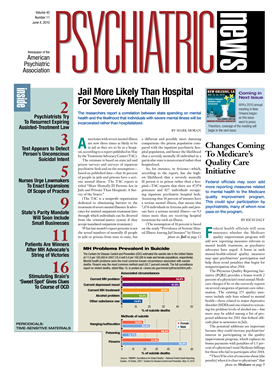Even as large employers begin to meet the regulations of the 2008 federal parity law, small businesses in Wisconsin will soon have to meet similar requirements.
Wisconsin Gov. Jim Doyle (D) signed a mental health parity measure (SB 362) into law on April 29 and was applauded by mental health advocates. The legislation thus extends the state's parity mandate beyond that of the federal parity law, which requires employers with 50 or more employees to offer parity insurance coverage. The new law requires qualifying group health plans for businesses with 10 or more employees to offer the same coverage for mental illness care as they do for other types of medical care.
Leaders of the advocacy group Mental Health America of Wisconsin (MHAW) said that the state law would reduce the risk and impact of mental illnesses, especially addiction disorders, which have a severe fiscal impact.
“We are thrilled to see the growing recognition that mental health is an integral part of health care and that we, as a society, need to be proactive in reducing the risk for mental and addictive disorders,” said Shel Gross, MHAW's director of public policy, in a written statement.
Mental health care advocates cited the economic recession as a key reason that the new law was needed. They said that the risks of developing a psychiatric illness or having an existing one become more severe were increasing with the stresses of the recession.
Small businesses in Wisconsin had raised concerns about the cost of the expanded parity requirement, but the Office of the Commissioner of Insurance (OCI) projected that the law would have only a small premium impact but bring considerable benefits. The law allows businesses that find their health insurance premiums have risen by more than 2 percent due to the new requirement to opt out of the parity mandate. The law, which will affect about 25 percent of insurance plans in the state, is expected to increase premiums by less than one-half of 1 percent.
An OCI assessment concluded that mental illness affects about 1 in 4 adults and 1 in 5 children in the state, equating to about 1.4 million Wisconsin residents. Additionally, the assessment concluded that treatments for most psychiatric conditions are highly effective, and most individuals can recover and lead meaningful and productive lives.
“Treatment, especially when provided early in the course of the illness, can reduce overall health care costs, because the presence of a mental disorder can interfere with treatment compliance for other conditions such as diabetes and heart disease,” said Kristina Finnel, interim president and CEO of MHAW, in a statement. “There are also considerable benefits to employers in reduced absenteeism, improved productivity, and reduced disability claims.”
